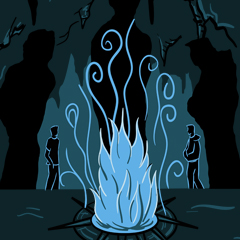Foundations of Philosophy (Ages 9-11)with Sally Zeiner To conclude last week's discussion of virtues, we tackled the difficult task of organizing our long list of ideas into specific virtues, defining them and giving examples. Our groups defined and presented the virtues of love, companionship, honesty, and courage. Each student should write a five sentence paragraph defining the virtue of their choice and offering at least one example from our reading this semester. Iron Hearted Violet is a challenging and thought provoking story, and we will spend this week discussing the philosophical issues that it raises. Students should finish the book, and come prepared to talk about one philosophical issue raised in this story. It can be something that we have already talked about - ethics, virtues, the nature of reality, and identity. Last class, students disagreed over whether the Nybbas is male or female (or neither), so all of the students should be prepared to state their opinion regarding the gender of the Nybbas, and provide examples directly from the story. “People say, 'What is the sense of our small effort?' They cannot see that we must lay one brick at a time, take one step at a time.” ― Dorothy Day Philosophy for Children (Ages 12-14)with Rich Piscopo  Plato's Allegory of the Cave Plato's Allegory of the Cave During our review last week to bring us up to speed after our winter hiatus, the class took a decidedly deep and profound direction. Because it was very philosophical in nature, I went where the children dared to go. A student asked what the difference was between experience and knowledge. This sparked a good epistemological dialogue, ending by saying knowledge (such as what one gains from books) is two-dimensional, and experience is three-dimensional. Experience falls under the category of knowledge, but is qualitatively different from book knowledge. It is deeper. I steered us back to the planned review where we explored the concept of preciousness. This brought up the phenomenon of love (love is an example of something that is precious). We spoke about the nature of love as being inexhaustible, and one cannot have too much love. The student said we may not be able to have too much love, then asked if we can have too little love. I referred to the Indian writer Yogananda who addressed this notion by saying love is out there in abundance; those who perceive there is not enough love are just not receiving it. Their "love receivers" are jammed with static. Then another student, who had been relatively quiet up to this point, said, "The truth is out there, but we just don't see it. We spend our lives seeking understanding." Then in response, another said, "Some people don't choose to seek understanding. It's easier to live behind the veil." I referred to Plato's Allegory of the Cave and to the book, Flatland. These are classic examples of the human condition of choosing "to live behind the veil". We then discussed the notion of Socratic Ignorance. We do not know the truth, yet we believe we do. When we do this, says Socrates, we are twice removed from the truth. Socrates taught that it was better to admit one's ignorance and then seek the truth; better to endure uncertainty and not jump to conclusions, than to live in an illusion. This led to a discussion on the purposes of studying philosophy. We agreed that one such purpose is to bring one to the awareness that one does indeed live behind a veil. And it is our task to try to remove it. Onward and forward. Editor's note: For those interested in learning more about Plato's Allegory of the Cave and the story, Flatland, you may enjoy a look back at this short post (with video) from Creative Thinking Circle I/Fall 2012. Comments are closed.
|
Categories
All
Archives
May 2016
|

 RSS Feed
RSS Feed